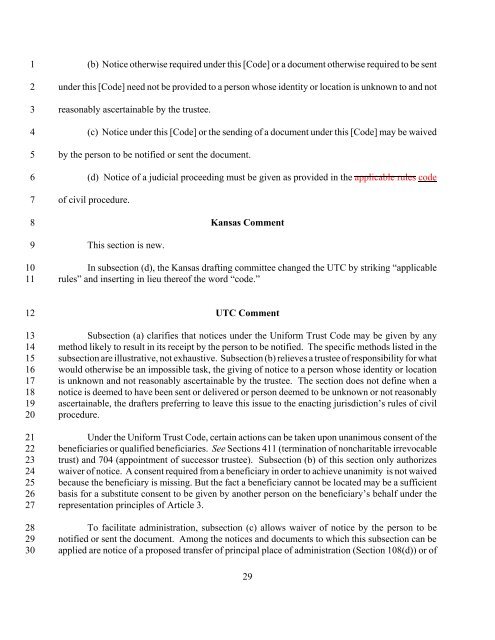uniform trust code - Kansas Judicial Branch
uniform trust code - Kansas Judicial Branch
uniform trust code - Kansas Judicial Branch
You also want an ePaper? Increase the reach of your titles
YUMPU automatically turns print PDFs into web optimized ePapers that Google loves.
1<br />
2<br />
3<br />
4<br />
5<br />
6<br />
7<br />
8<br />
9<br />
10<br />
11<br />
(b) Notice otherwise required under this [Code] or a document otherwise required to be sent<br />
under this [Code] need not be provided to a person whose identity or location is unknown to and not<br />
reasonably ascertainable by the <strong>trust</strong>ee.<br />
(c) Notice under this [Code] or the sending of a document under this [Code] may be waived<br />
by the person to be notified or sent the document.<br />
(d) Notice of a judicial proceeding must be given as provided in the applicable rules <strong>code</strong><br />
of civil procedure.<br />
<strong>Kansas</strong> Comment<br />
This section is new.<br />
In subsection (d), the <strong>Kansas</strong> drafting committee changed the UTC by striking “applicable<br />
rules” and inserting in lieu thereof the word “<strong>code</strong>.”<br />
12<br />
13<br />
14<br />
15<br />
16<br />
17<br />
18<br />
19<br />
20<br />
21<br />
22<br />
23<br />
24<br />
25<br />
26<br />
27<br />
28<br />
29<br />
30<br />
UTC Comment<br />
Subsection (a) clarifies that notices under the Uniform Trust Code may be given by any<br />
method likely to result in its receipt by the person to be notified. The specific methods listed in the<br />
subsection are illustrative, not exhaustive. Subsection (b) relieves a <strong>trust</strong>ee of responsibility for what<br />
would otherwise be an impossible task, the giving of notice to a person whose identity or location<br />
is unknown and not reasonably ascertainable by the <strong>trust</strong>ee. The section does not define when a<br />
notice is deemed to have been sent or delivered or person deemed to be unknown or not reasonably<br />
ascertainable, the drafters preferring to leave this issue to the enacting jurisdiction’s rules of civil<br />
procedure.<br />
Under the Uniform Trust Code, certain actions can be taken upon unanimous consent of the<br />
beneficiaries or qualified beneficiaries. See Sections 411 (termination of noncharitable irrevocable<br />
<strong>trust</strong>) and 704 (appointment of successor <strong>trust</strong>ee). Subsection (b) of this section only authorizes<br />
waiver of notice. A consent required from a beneficiary in order to achieve unanimity is not waived<br />
because the beneficiary is missing. But the fact a beneficiary cannot be located may be a sufficient<br />
basis for a substitute consent to be given by another person on the beneficiary’s behalf under the<br />
representation principles of Article 3.<br />
To facilitate administration, subsection (c) allows waiver of notice by the person to be<br />
notified or sent the document. Among the notices and documents to which this subsection can be<br />
applied are notice of a proposed transfer of principal place of administration (Section 108(d)) or of<br />
29

















